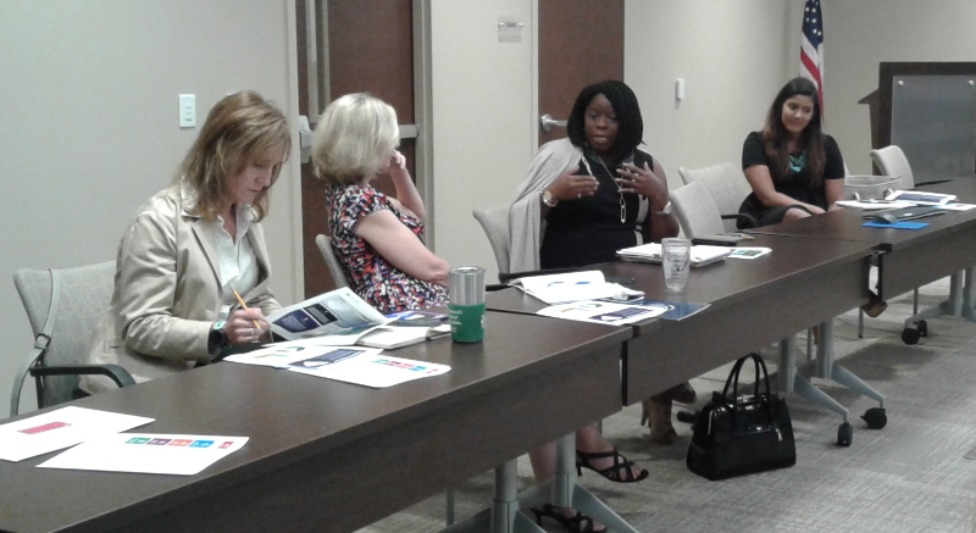Resilient Richland held a recent training on adverse childhood experiences for city of Columbia employees in coordination with Children’s Trust and United Way of the Midlands. Neil White, who tells the stories of Children’s Trust, covered the event.

Missy Caughman, Anita Floyd, Wanda Austin and Aditi Srivastav Bussells discuss the film “Resilience” and the importance of understanding the impact of adverse childhood experiences with city of Columbia employees at a group training.
Wanda Austin recognizes the importance of connecting with children, especially those in need of support.
As the senior administrative coordinator for the city of Columbia’s parks and recreation department, Austin and the department’s other staff members regularly interact with children through after-school programs, youth sports, and camps.
She understands why staffers must be able to ascertain whether children might be dealing with adverse childhood experiences (ACEs), which are traumatic events in their lives that can lead to short-term behavioral issues at school and in recreational settings in addition to long-term poor health and social outcomes into adulthood.
Along with other key members of city staff, Austin attended a September meeting at United Way of the Midlands, where a screening of the documentary “Resilience” took place along with a discussion of ACEs. Research shows that children who are exposed to physical and emotional abuse, divorce, substance use/misuse, domestic violence and mental illness are much more likely to become adults with problems like depression, alcohol misuse, obesity, heart and liver disease, and decreased workplace performance.

Wanda Austin
“The earlier we get this education out there, and get kids to understand what’s the ‘normal,’ then we’ll know how to recognize those signs as we go along in life,” said Austin, who added that many kids don’t realize the level of adversity they’re facing in their homes.
United Way hosted the meeting in concert with Children’s Trust, which leads the ACE Initiative in South Carolina, and a newly-formed coalition called Resilient Richland, which is a community-based prevention effort where leaders are using ACE data and tools to help inform their work on a local level.
As part of the initiative, Resilient Richland has a vision of a thriving community where children and families are resilient, safe and able to achieve their full potential in life. Its mission is to transform Richland County into a trauma-informed community by developing the systems and services that prevent and treat the toxic effects of trauma and promote the well-being of all children and families.
The training for city of Columbia employees served as a way to reach out across the community. Resilient Richland includes participants from local nonprofits, state agencies, law enforcement, the education system and faith-based groups. Aditi Srivastav Bussells, Children’s Trust research and community impact manager, stated that city employees can take what they have learned and apply it to the policies, procedures and practices within their specific departments.

Aditi Srivastav Bussells
“The city of Columbia has the unique opportunity to set the standard for the rest of South Carolina,” Bussells said. “Becoming trauma-informed means that each of the city’s departments are actively promoting the well-being of the community. This could mean that policies are changing to be more reflective of the science of ACEs, such as family leave policies, or programs are collaborative and engaging an interdisciplinary group of people that work with children and families to help them in meeting their greatest potential.”
Austin noted that recreation staff members go through Department of Social Services certification training every year, and she now would like them to attend an ACE training that includes “Resilience,” which is directed by James Redford, son of Robert Redford. The film delves into the science of ACEs and showcases the movement by leaders in pediatrics, education and social welfare to treat and prevent toxic stress through strategies and therapies that better protect children.
Missy Caughman, the budget and program management director for the city of Columbia, believes issues such as ACEs that negatively impact well-being are best managed by people working together.
“I’m always glad and eager to see when we’re able to work together in a collaborative way to address community-wide issues, realizing that not one organization, not one entity, has all the answers, especially when the problems are so multi-faceted,” Caughman said. “To be able to apply this research to our programs, actions and next steps is going to be beneficial for this community.”
Bussells added that employees don’t have to be working directly with kids to make a difference.
“It can start as small as empowering your employees to practice self-care and provide them with opportunities to improve their own well-being,” she said.
The ACE Initiative has built a core of 70-plus master trainers who can reach out to different groups across South Carolina to talk about ACEs and explain how Children’s Trust is collecting and disseminating data, building a prevention planning framework, and promoting sound legislative policy to address ACEs in our communities. The trainers educate community leaders, policymakers, and businesspeople about the need to build resilience among children and families.
Anita Floyd, senior vice president of community impact and strategic implementation for United Way of the Midlands, said Resilient Richland is working to improve the system of care to address, prevent and reduce trauma. She cited 67 percent of adults in Richland County as having had at least one adverse childhood experience in their lives, one reason Resilient Richland gathered a diverse leadership team of 30 people to guide the effort.
“We’re talking to as many people as we can who would have any kind of impact on the system of care. If you are someone who interacts as a professional or a volunteer with children and youth, we think there are some fundamental things that would help you do your work,” Floyd said. “It’s important that we have all the leadership understand the extent of the issue and what are the strategies to mitigate ACEs. This is really about how do we change this community to actually create resilience and help everybody thrive.”
If you want to get involved, you can attend the upcoming launch of Resilient Richland to be held Nov. 1 at the State Museum. Learn more about adverse childhood experiences and the ACE Initiative, which is funded by the BlueCross®BlueShield® of South Carolina Foundation, an independent licensee of the Blue Cross and Blue Shield Association.




